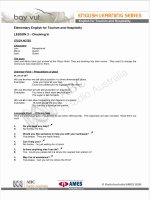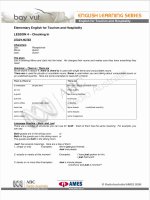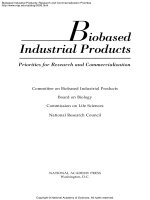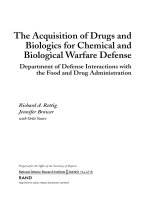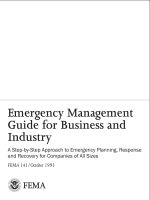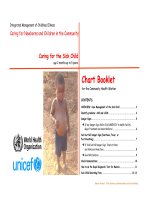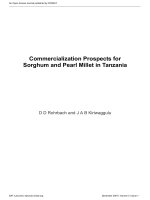expert resumes for teachers and educators
Bạn đang xem bản rút gọn của tài liệu. Xem và tải ngay bản đầy đủ của tài liệu tại đây (10.95 MB, 306 trang )
Wendy S. Enelow and Louise M. Kursmark
Dozens of professional resume writers share their SECRETS
and SAMPLE RESUMES for landing the TOP TEACHING and
TRAINING JOBS:
• Early Childhood Educators
• Elementary Educators
• Secondary-School Educators
• Specialty Teachers
• Educational Support Professionals
• University Educators
• Educational Administrators
• Corporate Training and Development Professionals
Includes a carefully selected gallery of resumes written by
dozens of PROFESSIONAL RESUME WRITERS.
TEACHERS AND EDUCATORS
EXPERT
RESUMES
F
O
R
SECOND
EDITION
OVER 180 pages of
SAMPLE RESUMES
targeted to
TEACHING JOBS—
from PRE-SCHOOL
to COLLEGE and
beyond!
exres-te cover 10/10/4 6:43 PM Page 1
TeAM YYePG
Digitally signed by TeAM YYePG
DN: cn=TeAM YYePG, c=US,
o=TeAM YYePG, ou=TeAM
YYePG, email=
Reason: I attest to the accuracy
and integrity of this document
Date: 2005.08.03 19:09:04 +08'00'
TEACHERS AND EDUCATORS
EXPERT
RESUMES
F
O
R
SECOND
EDITION
Wendy S. Enelow and Louise M. Kursmark
™
00 Expert Res Teachers FM 12/19/04 12:27 AM Page i
Expert Resumes for Teachers and Educators, Second Edition
© 2005 by Wendy S. Enelow and Louise M. Kursmark
Published by JIST Works, an imprint of JIST Publishing, Inc.
8902 Otis Avenue
Indianapolis, IN 46216-1033
Phone: 1-800-648-JIST Fax: 1-800-JIST-FAX E-mail:
Visit our Web site at www.jist.com for information on JIST, free job search tips,
book chapters, and how to order our many products! For free information on 14,000
job titles, visit www.careeroink.com.
Quantity discounts are available for JIST books. Please call our Sales Department at
1-800-648-5478 for a free catalog and more information.
Acquisitions and Development Editor: Lori Cates Hand
Cover Designer: designLab, Seattle
Interior Designer and Page Layout: Trudy Coler
Proofreader: Jeanne Clark
Indexer: Henthorne House
Printed in the United States of America
09 08 07 06 05 9 8 7 6 5 4 3 2 1
Library of Congress Cataloging-in-Publication Data
Enelow, Wendy S.
Expert resumes for teachers and educators / Wendy S. Enelow and Louise M. Kursmark
2nd ed.
p. cm.
Includes index.
ISBN 1-59357-126-7 (alk. paper)
1. Teachers Employment. 2. Educators Employment. 3. Résumés (Employment)
4. Cover letters. I. Kursmark, Louise. II. Title.
LB1780.E64 2005
808'.06665 dc22 2004029863
All rights reserved. No part of this book may be reproduced in any form or by any means, or
stored in a database or retrieval system, without prior written permission of the publisher except
in the case of brief quotations embodied in articles or reviews. Making copies of any part of
this book for any purpose other than your own personal use is a violation of United States
copyright laws. For permission requests, please contact the Copyright Clearance Center at
www.copyright.com or (978) 750-8400.
We have been careful to provide accurate information in this book, but it is possible that errors
and omissions have been introduced. Please consider this in making any career plans or other
important decisions. Trust your own judgment above all else and in all things.
Trademarks: All brand names and product names used in this book are trade names,
service marks, trademarks, or registered trademarks of their respective owners.
ISBN 1-59357-126-7
00 Expert Res Teachers FM 1/3/05 1:47 PM Page ii
ABOUT THIS BOOK vii
I
NTRODUCTION ix
PART I: Resume Writing, Strategy, and Formats 1
CHAPTER 1: Resume Writing Strategies for Education
Professionals 3
The Most Critical Question: Resume or CV? 4
Resume Strategies 5
Resume Strategy #1: Who Are You and How Do You Want
to Be Perceived? 5
Resume Strategy #2: Sell It to Me…Don’t Tell It to Me 6
Resume Strategy #3: Use Keywords 7
Resume Strategy #4: Use the “Big” and Save the “Little” 9
Resume Strategy #5: Make Your Resume “Interviewable” 9
Resume Strategy #6: Eliminate Confusion with Structure and
Context 10
Resume Strategy #7: Use Function to Demonstrate
Achievement 10
Resume Strategy #8: Remain in the Realm of Reality 11
Resume Strategy #9: Be Confident 11
There Are No Resume Writing Rules 11
Content Standards 11
Presentation Standards 15
Accuracy and Perfection 18
TABLE OF
CONTENTS
00 Expert Res Teachers FM 12/19/04 12:27 AM Page iii
CHAPTER 2: Writing Your Resume 19
Step-by-Step: Writing the Perfect Resume 20
Contact Information 20
Career Summary 21
Professional Experience 23
Education, Credentials, and Certifications 28
The “Extras” 30
Writing Tips, Techniques, and Important Lessons 34
Get It Down—Then Polish and Perfect It 34
Write Your Resume from the Bottom Up 34
Include Notable or Prominent “Extra” Stuff in Your
Career Summary 35
Use Resume Samples to Get Ideas for Content, Format,
and Organization 35
Include Dates for Your Work Experience? 36
Always Send a Cover Letter When You
Forward Your Resume 37
Never Include Salary History or Salary Requirements
on Your Resume 37
Always Remember That You Are Selling 38
CHAPTER 3: Printed, Scannable, Electronic, and
Web Resumes 39
The Four Types of Resumes 39
The Printed Resume 39
The Scannable Resume 39
The Electronic Resume 40
The Web Resume 42
The Four Resume Types Compared 46
Are You Ready to Write Your Resume? 48
iv
Expert Resumes for Teachers and Educators
00 Expert Res Teachers FM 12/19/04 12:27 AM Page iv
PART II: Sample Resumes for Teachers and Educators 49
CHAPTER 4: Resumes for Early-Childhood Educators 51
CHAPTER 5: Resumes for Elementary Educators 65
CHAPTER 6: Resumes for Secondary-School Educators 89
CHAPTER 7: Resumes for Specialty Teaching Positions 109
CHAPTER 8: Resumes for Educational Support Professionals 133
CHAPTER 9: Resumes for University Educators 151
CHAPTER 10: CVs (Curriculum Vitae) 171
CHAPTER 11: Resumes for Educational Administrators 189
CHAPTER 12: Resumes for Corporate Training and
Development Professionals
223
PART III: Cover Letters for Teachers and Educators 251
CHAPTER 13: Writing a Winning Cover Letter 253
Six Steps to Writing Better Cover Letters 255
Step 1: Identify Your Key Selling Points 255
Step 2: Pre-Plan 257
Step 3: Write the Opening Paragraph 257
Step 4: Write the Body 258
Step 5: Write the Closing 259
Step 6: Polish, Proofread, and Finalize 260
Authors’ Best Tips for Writing Winning Cover Letters 261
Don’t Reinvent the Wheel 261
Sell It to Me; Don’t Tell It to Me 262
Get Over Writer’s Block 262
Answer the Employer’s Most Important Question:
“What Can You Do for Me?” 262
Cover Letter Checklist 263
v
Table of Contents
00 Expert Res Teachers FM 12/19/04 12:27 AM Page v
vi
Expert Resumes for Teachers and Educators
CHAPTER 14: Sample Cover Letters 265
Appendix: Internet Career Resources 273
Job Search Sites 273
Company Information 275
Dicitionaries and Glossaries 276
Interviewing Tips and Techniques 277
Salary and Compensation Information 277
Index of Contributors 279
Index 285
00 Expert Res Teachers FM 12/19/04 12:27 AM Page vi
The “business” of education and its related careers and professions is showing
strong and steady growth, according to the U.S. Department of Labor’s projec-
tions. Experts anticipate that this growth will continue through at least 2008.
The business of education has changed. When we talk about education profes-
sionals, we’re no longer referring to just classroom teachers and principals. The
specializations and subspecializations of the education profession have grown
phenomenally and now include the following:
•Pre-school, elementary, secondary, special education/remedial, gifted and tal-
ented, college and university, and proprietary school teachers
• School-based counselors, therapists, psychologists, social workers, and child
advocates
• Librarians, multimedia specialists, and research assistants
• School administrators, assistant principals, principals, college and university
deans, and department chairpersons
• Education support professionals, including coaches, security officers, DARE
officers, secretaries, clerks, and transportation staff
• Corporate training and development professionals, instructional technology
designers, multimedia training developers, “stand-up” trainers, and training
consultants
And the list continues. As an educator, you no longer have to look to the school
system for employment opportunities. There is now a wealth of for-profit training
companies, tens of thousands of companies that employ training professionals, and
unlimited opportunities as a self-employed trainer and coach. There are thousands
and thousands of positions with the more traditional school-based systems, col-
leges, and universities. What this means is that there are unlimited employment
opportunities, and that’s great news for you!
To take advantage of all of these opportunities, you must first develop a powerful,
performance-based resume. To be a savvy and successful job seeker, you must
know how to communicate your qualifications in a strong and effective written
presentation. Sure, it’s important to let employers know essential details, but a
resume is more than just your job history and academic credentials. A winning
resume is a concise yet comprehensive document that gives you a competitive edge
in the job market. Creating such a powerful document is what this book is all
about.
ABOUT THIS
BOOK
00 Expert Res Teachers FM 12/19/04 12:27 AM Page vii
As we move through this book, we’ll explore the changes in resume writing and
presentation that have arisen over the past decade. Today’s resumes are achieve-
ment- and success-focused, highlighting your individual skills, qualifications, and
strong work experience. Whereas previously resumes were almost always printed
on paper and mailed, e-mail has become the chosen method for resume distribu-
tion in many industries today. In turn, many of the traditional methods for “typ-
ing” and presenting resumes have changed dramatically. This book will instruct
you in the methods for preparing resumes for e-mail, scanning, and Web site post-
ing, as well as the traditional printed resume.
By using Expert Resumes for Teachers and Educators as your professional guide,
you will succeed in developing a powerful and effective resume that opens doors,
gets interviews, and helps you land your next great opportunity!
viii
Expert Resumes for Teachers and Educators
00 Expert Res Teachers FM 12/19/04 12:27 AM Page viii
According to the U.S. Department of Labor’s Bureau of Labor Statistics, the
education professions are projected to show relatively strong and steady growth
through 2008. Some of the most interesting statistics anticipate growth for the
following specializations within the field of education:
Percentage of
Specialization Growth Through 2008
School Health Professionals 36.9%
Special Education Teachers 33.7%
School Counselors, Secondary School 22.6%
Teachers, and College Faculty
Administrative Support Personnel 19.9%
Pre-School, Kindergarten, and Elementary 11.5%
School Teachers
Education Administrators 11.5%
Librarians and Vocational Education 11.5%
Instructors
These statistics and others clearly demonstrate that there is tremendous opportu-
nity within the education professions. Not only is the number of positions increas-
ing year after year, salaries are also moving upward, although at a somewhat slower
rate of increase than the position growth rate.
The dramatic and rapid emergence of technology throughout all aspects of our
lives has also impacted the field of education with a host of new professional
opportunities.
To take advantage of these opportunities, you must be an educated job seeker.
That means you must know what you want in your career, where the hiring action
is, what qualifications and credentials you need to attain your desired career
goals, and how best to market your qualifications. It is no longer enough to be a
talented teacher, librarian, administrator, or training and development professional.
Now, you must be a strategic marketer, able to package and promote your experi-
ence to take advantage of this wave of employment opportunity!
There’s no doubt that the employment market has changed dramatically from only
a few years ago. According to the U.S. Department of Labor, you should expect
INTRODUCTION
00 Expert Res Teachers FM 12/19/04 12:27 AM Page ix
x
Expert Resumes for Teachers and Educators
to hold between 10 and 20 different jobs during your career. No longer is stability
the status quo. Today, the norm is movement, onward and upward, in a fast-paced
and intense employment market. And to stay on top of all the changes and oppor-
tunities, you must proactively control and manage your career.
Education Job Search Questions and Answers
Whether you’re currently employed in the education field or looking to enter the
profession for the first time, here’s some practical advice.
HOW DO YOU ENTER THE EDUCATION PROFESSION?
As with any other industry or profession, your employment experience, education,
and credentials are the keys to entry and long-term success. It is difficult to obtain
a position in education without some related work experience, relevant education,
or credentials. Here are a few pointers:
• If you’re just starting to plan and build your career, consider a four-year
degree in an education-related discipline or completion of a teaching certifica-
tion program. Once you’ve earned your initial degree, you’ll want to keep your
sights focused on an advanced degree. Education is one of many professions
where master’s and doctoral degrees are virtually prerequisites for long-term
career advancement.
• If you’re an educator, administrator, or other school-based professional
who wants to move forward in your career to a position of greater responsibil-
ity, leadership, and compensation, focus your resume on what you have
achieved thus far in your career, your specific areas of expertise, your profes-
sional credentials, and most significantly, why you are a valuable resource.
• If you’re a classroom teacher or school administrator who wants to make
a move into corporate training and development, sell your knowledge and
experience in order to “connect” yourself to T&D. Highlight the programs
and courses you’ve designed, the instructional materials you’ve created, the
training you’ve provided to other educational professionals, and more. Make
the case that you’re not an outsider, but rather an insider who has experience
in organizational needs assessment, training, program design, and presentation.
Link yourself to the new industry.
• If you’re a successful businessperson, technologist, manager, administra-
tor, or the like, but have no teaching or educational experience, focus your
resume on your professional experiences and how they relate to the field of
education. Who better to teach a business-management course than a business
manager? Who better to manage the finances of a school board than an experi-
enced CFO? Search your background and highlight the “right” skills to posi-
tion yourself to transition into an education-related career.
00 Expert Res Teachers FM 12/19/04 12:27 AM Page x
Introduction
xi
WHAT IS THE BEST RESUME STRATEGY IF YOU’RE ALREADY IN THE
EDUCATION PROFESSION?
If you’re already employed in the education field but are interested in moving
onward and upward, remember one critical fact:
Your resume is a marketing tool written to sell YOU!
If you’re a classroom teacher, sell the fact that you’ve been instrumental in devel-
oping new course curricula and designing innovative instructional tools. If you’re
a school administrator, sell the new initiatives you’ve introduced to strengthen
educational standards and build support throughout your local community. If
you’re a corporate training specialist, sell the fact that you conceived, developed,
and led the corporation’s first-ever multimedia training presentations.
When writing your resume, your challenge is to create a picture of knowledge,
action, and results. In essence, you’re stating “This is what I know, this is how I’ve
used it, and this is how well I’ve performed.” Success sells, so be sure to highlight
yours. If you don’t, no one else will.
WHERE ARE THE JOBS?
The jobs are everywhere—from major universities to small rural school districts;
from government education lobbies to high school libraries; from the corporate
giants of the world to the local instructional technology company. The jobs are in
• Classroom teaching, at all levels and in all types of early-childhood, primary,
secondary, and advanced educational institutions, both public and private.
• Development of new educational and instructional systems, methodologies,
and protocols.
• Design of new courses, new curricula, new instructional materials, and other
new teaching and learning resources.
• Administration, funding, and management of educational programs, sys-
tems, and facilities.
• Educational support professions (for example, librarians, coaches, teaching
aides, and school counselors).
• Design, engineering, marketing, and support of instructional technologies,
applications, and tools.
• Educational research, funding, and outreach for both public and private
research facilities, universities, and foundations.
• Design and delivery of corporate training and development programs.
In short, the jobs are everywhere.
HOW DO YOU GET THE JOBS?
To answer this question, we need to review the basic principle underlying job
search:
Job search is marketing!
00 Expert Res Teachers FM 12/19/04 12:27 AM Page xi
You have a product to sell—yourself—and the best way to sell it is to use all
appropriate marketing channels just as you would for any other product.
Suppose you wanted to sell televisions. What would you do? You’d market your
products using newspaper, magazine, and radio advertisements. You might devel-
op a company Web site to build your e-business, and perhaps you’d hire a field
sales representative to market to major retail chains. Each of these is a different
marketing channel through which you’re attempting to reach your audience.
The same is true for job search. You must use every marketing channel that’s right
for you. Unfortunately, there is no single formula. What’s right for you depends
on your specific career objectives—type of position, type of industry, geographic
restrictions, salary requirements, and more.
Following are the most valuable marketing channels for a successful job search
within the education industry. We’ve ranked them in order from most effective to
least effective.
1. Referrals. There is nothing better than a personal referral to a school, compa-
ny, or institution, either in general or for a specific position. Referrals can open
doors that, in most instances, would never be accessible any other way. If you
know anyone who could possibly refer you to a specific organization, contact
that person immediately and ask for assistance.
2. Networking. Networking is the backbone of every successful job search.
Although you may consider it a task, it is essential that you network effectively
with your professional colleagues and associates, past employers, past cowork-
ers, parents of past students, neighbors, community leaders, and others who
may know of opportunities that are right for you. Another good strategy is to
attend meetings of professional associations in your area to make new contacts
and expand your professional network. And particularly in today’s nomadic job
market—where you’re likely to change jobs every few years—the best strategy
is to keep your network “alive” even when you’re not searching for a new
position.
3. Responses to newspaper, magazine, and periodical advertisements.
Although, as you’ll read below, the ability to post job opportunities online has
reduced the overall number of print advertisements, they still abound. Do not
forget about this “tried and true” marketing strategy. If they’ve got the job
and you have the qualifications, it’s a perfect fit.
4. Responses to online job postings. One of the greatest advantages of the
technology revolution is an employer’s ability to post job announcements and
a job seeker’s ability to respond immediately via e-mail. It’s a wonder! In most
(but not all) instances, these are bona fide opportunities, and it’s well worth
your while to spend time searching for and responding to appropriate postings.
However, don’t make the mistake of devoting too much time to searching the
Internet. It can consume a huge amount of your time that you should spend
on other job search efforts.
To expedite your search, here are some of the largest and most widely used
online job posting sites—presented alphabetically, not necessarily in order of
effectiveness or value (see the appendix for a more complete listing of job
xii
Expert Resumes for Teachers and Educators
00 Expert Res Teachers FM 12/19/04 12:27 AM Page xii
Introduction
search Web sites, including several that are specifically targeted to education
professionals):
xiii
www.careerbuilder.com
www.dice.com
www.flipdog.monster.com
www.hotjobs.yahoo.com
www.monster.com
www.sixfigurejobs.com
www.wantedtechnologies.com
5. Targeted e-mail campaigns (resumes and cover letters) to recruiters.
Recruiters have jobs, and you want one. It’s pretty straightforward. The only
catch is to find the “right” recruiters who have the “right” jobs. Therefore,
you must devote the time and effort to prepare the “right” list of recruiters.
There are many resources on the Internet where you can access information
about recruiters (for a fee), sort that information by industry (education,
training and development, software development, and so on), and then cross-
reference with position specialization (teaching, training, administration,
library services, and so on). This allows you to identify just the “right”
recruiters who would be interested in a candidate with your qualifications.
Because these campaigns are transmitted electronically, they are easy and inex-
pensive to produce.
When working with recruiters, it’s important to realize that they do not work
for you! Their clients are the hiring companies that pay their fees. They are not
in business to “find a job” for you, but rather to fill a specific position with a
qualified candidate, either you or someone else. To maximize your chances of
finding a position through a recruiter or agency, don’t rely on just one or two
recruiters, but distribute your resume to many that meet your specific criteria.
6. Online resume postings. The Net is swarming with reasonably priced (if not
free) Web sites where you can post your resume. It’s quick, easy, and the only
passive thing you can do in your search. All of the other marketing channels
require action on your part. With online resume postings, once you’ve posted,
you’re done. You then just wait (and hope!) for some response.
7. Targeted e-mail and print campaigns to employers. Just as with campaigns
to recruiters (see item 5 above), you must be extremely careful to select just
the right employers that would be interested in a candidate with your qualifica-
tions. The closer you stick to “where you belong” in relation to your specific
experience, the better your response rate will be. If you are targeting technolo-
gy companies, you can also contact these employers via e-mail. If you are look-
ing at employers outside the technology industries, which is extremely likely
for most education professionals, we believe that print campaigns (paper and
envelopes mailed the old-fashioned way) are a more suitable and effective pres-
entation—particularly if you are a management or executive candidate.
8. In-person “cold calls” to companies and recruiters. We consider this the
least effective and most time-consuming marketing strategy for education jobs.
It is extremely difficult to just walk in the door and get in front of the right
person, or any person who can take hiring action. You’ll be much better off
focusing your time and energy on other, more productive channels.
00 Expert Res Teachers FM 12/19/04 12:27 AM Page xiii
Conclusion
Career opportunities abound within the education industries and professions
today. It has never been easier to learn about and apply for jobs. Arm yourself with
a powerful resume and cover letter, identify the most appropriate marketing chan-
nels, and start your search today. You’re destined to reach the next rung on your
career ladder.
xiv
Expert Resumes for Teachers and Educators
00 Expert Res Teachers FM 12/19/04 12:27 AM Page xiv
PART I
Resume Writing,
Strategy, and
Formats
CHAPTER 1: Resume Writing Strategies for Education
Professionals
C
HAPTER 2: Writing Your Resume
CHAPTER 3: Printed, Scannable, Electronic, and Web Resumes
00 Expert Res Teachers FM 12/19/04 12:27 AM Page 1
00 Expert Res Teachers FM 12/19/04 12:27 AM Page 2
Resume Writing Strategies for
Education Professionals
If you’re reading this book, chances are you’ve decided to make a
career move. It may be because of one of the following reasons:
•You’re graduating from college or a certification program and
are ready to launch your professional career.
•You’ve just earned your graduate degree and are ready to make
a step upward in your career.
•You’re ready to leave your current position and move up the
ladder to a higher-paying and more responsible position.
•You’ve decided on a career change and will be looking at oppor-
tunities in allied professions and industries.
•You’re unhappy with your current school or employer, or its
management/administrative team, and have decided to pursue
opportunities elsewhere.
•You’ve been laid off, downsized, or otherwise left your position
and must find a new one.
•You’ve completed a contract assignment and are looking for a
new “free agent” job or perhaps a permanent position.
•You’re relocating to a new area and need to find a new job.
•You’re returning to the work force after several years of unem-
ployment or retirement.
•You’re simply ready for a change.
No matter the reason for your current job search, a powerful
resume is an essential component of your campaign. In fact, it is
virtually impossible to conduct a search without a resume. It is your
calling card that briefly, yet powerfully, communicates the skills,
qualifications, experience, and value you bring to a prospective
employer. It is the document that will open doors and generate
interviews. It is the first thing people will learn about you when
you forward it in response to an advertisement, and it is the thing
CHAPTER 1
01 Expert Res Teachers CH01 12/16/04 10:52 PM Page 3
Part I: Resume Writing, Strategy, and Formats
4
they’ll remember when they’re reviewing your qualifications after an
interview.
Your resume is a sales document, and you are the product! You must identify the
features (what you know and what you can do) and benefits (how you can help an
employer) of that product, and then communicate them in a concise and hard-
hitting written presentation. Remind yourself over and over as you work your way
through the resume process that you are writing marketing literature designed to
sell a new product—you—into a new position.
Your resume can have tremendous power and a phenomenal impact on your job
search. Don’t take it lightly. Rather, devote the time, energy, and resources that
are essential to developing a resume that is well-written, visually attractive, and
effective in communicating who you are and how you want to be perceived.
The Most Critical Question: Resume or CV?
As an education professional, you have to ask yourself one critical question before
you even begin to think about writing a single word of your resume:
Do you need a resume or do you need a curriculum vitae (CV)?
As we’ve discussed, a resume is a sales and marketing tool that is designed to
entice a prospective employer to call you for an interview. It is a teaser, giving just
enough information to establish you as a credible candidate. A resume focuses on
the highlights of your career, your most notable achievements and contributions,
your educational credentials, and more. Succinctly stated, it is your own personal
career advertisement. It’s usually one to two pages long, but if you’ve been in the
work force for a long time and have extensive accomplishments, it is sometimes
acceptable to use three pages.
A CV, on the other hand, is a less “aggressive” document. Obviously, just as with
a resume, your objective is to sell yourself into a new position. However, the sell is
more subtle, using your educational credentials, professional and teaching experi-
ence, research experience, publications, task forces, committees, and more to
establish yourself as a qualified candidate. CVs, by their nature, tend to be longer
than most resumes, anywhere from two to three pages to as many as 10 or more.
Length should not be a consideration when preparing a CV; rather, your focus
should be on preparing a comprehensive document that includes all of your quali-
fications and credentials.
As you look through all of the samples in chapters 4 through 12, you will note a
dramatic difference in tone and style between resumes and CVs. However, for the
purpose of this book, when we refer to resumes, we are, unless otherwise noted,
also referring to CVs.
If you’re uncertain about whether to write a resume or a CV, the following table
may guide your decision-making. However, there are no hard-and-fast rules, and
resume writing is an art, not a science. Each decision is made based on the qualifi-
cations and experience of each candidate and that individual’s current career goals.
01 Expert Res Teachers CH01 12/16/04 10:52 PM Page 4
5
Chapter 1: Resume Writing Strategies for Education Professionals
Profession CV Resume
Classroom teacher X
College or university professor X X
Educational researcher/scientist X X
School administrator X X
College or university administrator X X
Guidance counselor X
School psychologist X X
Librarian/media specialist X
Corporate training professional X
In deciding which format to use, consider the following:
• What is most accepted for your profession and the organizations you’re
targeting?
• Which format will best represent you and your qualifications?
• What will your competitors (those also vying for the position) use?
To add to the confusion, people in traditional CV fields such as medicine, law, and
academia often use the term “CV” when referring to what is in fact a resume! We
suggest you review the samples in chapters 4 through 12 and research your target
institutions to find out the preferred format for your specific circumstances.
Resume Strategies
Following are the nine core strategies for writing effective and successful resumes.
RESUME STRATEGY #1: WHO ARE YOU AND HOW DO YOU
WANT TO BE PERCEIVED?
Now that you’ve decided to look for a new position, the very first step is to identi-
fy your career interests, goals, and objectives. This task is critical, because it is the
underlying foundation for what you will include in your resume, how you will
include it, and where you will include it. You cannot write an effective resume
without knowing, at least to some degree, what type or types of positions you will
be seeking.
There are two concepts to consider here:
• Who you are: This relates to what you have done professionally and/or aca-
demically. Are you a teacher, school administrator, librarian, or corporate
trainer? Are you an instructional media designer, curriculum developer, or
education grant writer? Are you a recent graduate with a degree in elementary
education, or do you have a master’s in education administration? Who are
you?
01 Expert Res Teachers CH01 12/16/04 10:52 PM Page 5
• How you want to be perceived: This relates to your current career objec-
tives. If you’re a teacher looking for a position as a departmental chairperson,
don’t focus solely on your teaching skills. Put an equal emphasis on curricula
and instructional materials you’ve designed, training of other educators, your
public speaking and association leadership experience, and the like. If you’re an
administrator for a for-profit educational services company interested in a uni-
versity administration position, highlight your experience in funding, program
development, records management, grant writing, and other functions directly
related to the administration of teaching programs and educational facilities.
The strategy, then, is to connect these two concepts by using the who you are
information that ties directly to the how you want to be perceived message to deter-
mine what information to include in your resume. By following this strategy,
you’re painting a picture that allows a prospective employer to see you as you wish
to be seen—as an individual with the qualifications for the type of position you are
pursuing.
WARNING: If you prepare a resume without first clearly identifying what your
objectives are and how you want to be perceived, your resume will have no
focus and no direction. Without the underlying knowledge of “This is what I
want to be,” you do not know what to highlight in your resume. In turn, the
document becomes a historical overview of your career and not the sales docu-
ment it is designed to be.
RESUME STRATEGY #2: Sell It to Me…Don’t Tell It to Me
We’ve already established the fact that resume writing is sales. You are the product,
and you must create a document that powerfully communicates the value of that
product. One particularly effective strategy for accomplishing this is the “Sell It to
Me…Don’t Tell It to Me” strategy, which impacts virtually every single word you
write on your resume.
If you “tell it,” you are simply stating facts. If you “sell it,” you promote it, adver-
tise it, and draw attention to it. Look at the difference in impact between these
examples:
Tell It Strategy: Participated in the development of a new curriculum
for the English department.
Sell It Strategy: Appointed to 3-person team charged with developing
a new English curriculum for 2,000+ students, and for designing and
producing all supporting instructional materials.
Tell It Strategy: Responsible for $28 million annual operating budget
for a 200,000-student school district.
Sell It Strategy: Managed $28 million annual operating budget for
200,000-student school district. Closed FY 03–04 10% under budget
Part I: Resume Writing, Strategy, and Formats
6
01 Expert Res Teachers CH01 12/16/04 10:52 PM Page 6
7
Chapter 1: Resume Writing Strategies for Education Professionals
by renegotiating services contracts, repairing used equipment, and elim-
inating excess expenditures.
Tell It Strategy: Served as a Multimedia Specialist for students in
grades 7–9.
Sell It Strategy: Designed and produced a host of multimedia presen-
tations to enrich student learning experiences and heighten retention
for an at-risk middle-school population.
What’s the difference between “telling it” and “selling it”? In a nutshell…
Telling It Selling It
Describes features. Describes benefits.
Tells what and how. Sells why the “what” and “how”
are important.
Details activities. Includes results.
Focuses on what you did. Details how what you did benefited
your employer, department, team
members, students, and so on.
RESUME STRATEGY #3: USE KEYWORDS
No matter what you read or who you talk to about job search, the concept of key-
words is sure to come up. Keywords (or, as they were previously known, buzz-
words) are words and phrases specific to a particular industry or profession. For
example, keywords for education include accreditation, classroom teaching, course
design, instructional media, peer counseling, research, scholastic standards, standard-
ized testing, student services, textbook review, and many, many more.
When you use these words and phrases—in your resume, in your cover letter, or
during an interview—you are communicating a very specific message. For exam-
ple, when you include the words “school administration” in your resume, your
reader will most likely assume that you have experience in budgeting, staffing,
teacher training, facilities management, community outreach, emergency response,
reporting and documentation, and more. As you can see, people will make infer-
ences about your skills based on the use of just one or two individual words.
Here are a few other examples:
•When you use the words multimedia instructional technology, people will
assume you have experience with programming, CD-ROM, graphic interfac-
ing, the Internet, and more.
• When you mention lifelong learning, readers and listeners will infer that
you have experience in the design and delivery of educational programs for
01 Expert Res Teachers CH01 12/16/04 10:52 PM Page 7
children and adults throughout all phases of the growth, development, and
aging lifecycle.
• By referencing intercollegiate athletics in your resume, you convey that you
most likely have experience in coaching, competitive athletics, game-play strat-
egy, scheduling, equipment management, and team leadership.
• When you use the term alumni relations, most people will assume that you
are familiar with alumni communications, fund raising, marketing, event plan-
ning, and more.
Keywords are also an integral component of the resume scanning process, whereby
employers and recruiters electronically search resumes for specific terms to find
candidates with the skills, qualifications, and credentials for their particular hiring
needs. Although resume scanning is not nearly as prevalent in education as in
other industries, particularly technology-related industries and large corporations
with significant hiring activity, it is increasing in popularity because of its ease and
efficiency.
In organizations where it has been implemented, electronic scanning has replaced
the more traditional method of an actual person reading your resume (at least ini-
tially). Therefore, to some degree, the only thing that matters in this instance is
that you have included the “right” keywords to match the school’s, company’s, or
recruiter’s needs. Without them, you will most certainly be passed over.
Of course, in virtually every instance your resume will be read at some point by
human eyes, so it’s not enough just to throw together a list of keywords and leave
it at that. In fact, it’s not even necessary to include a separate paragraph called a
“Keyword Summary” on your resume. A better strategy is to incorporate key-
words naturally into the text within the appropriate sections of your resume.
Keep in mind, too, that keywords are arbitrary; there is no defined set of keywords
for a classroom teacher, university professor, corporate trainer, librarian, or educa-
tional services administrator. Employers searching to fill these positions develop a
list of terms that reflect the specifics they desire in a qualified candidate. These
might be a combination of professional qualifications, skills, education, length of
experience, and other easily defined criteria, along with “soft skills,” such as lead-
ership, problem-solving, and communication.
NOTE: Because of the complex and arbitrary nature of keyword selection, we
cannot overemphasize how vital it is to be certain that all of the keywords that
represent your experience and knowledge are included in your resume!
How can you be sure that you are including all the keywords and the right key-
words? Just by describing your work experience, achievements, credentials, publi-
cations, public speaking engagements, and the like, you will naturally include most
of the terms that are important in your field. To cross-check what you’ve written,
review online or print job postings for positions that are of interest to you. Look
at the precise terms used in the ads and be sure you have included them in your
resume (as appropriate to your skills and qualifications).
Part I: Resume Writing, Strategy, and Formats
8
01 Expert Res Teachers CH01 12/16/04 10:52 PM Page 8
9
Chapter 1: Resume Writing Strategies for Education Professionals
Another great benefit of today’s technology revolution is our ability to find instant
information, even information as specific as keywords for the education and train-
ing industries. Refer to the appendix to find Web sites that have thousands of edu-
cation keywords, some with descriptions. Remember also to scan a variety of job
listings to pick up the “buzzwords” and current terminology. These are outstand-
ing resources.
RESUME STRATEGY #4: USE THE “BIG” AND SAVE THE “LITTLE”
When deciding what to include in your resume, try to focus on the “big” things—
new programs, new curricula, reduced operating costs, improved profitability,
major projects, improvements in student test results, and more. Give a good,
broad-based picture of what you were responsible for and how well you did it.
Here’s an example:
Senior-level Administrator with full responsibility for the strategic planning,
development, budgeting, and leadership of Admissions, Financial Aid,
Alumni Relations, and Career Development departments for a 13,000-
student university. Manage $900,000 in annual operating and administra-
tive budgets. Direct a staff of 42.
Then, save the “little” stuff—the details—for the interview. With this strategy, you
will accomplish two things: You’ll keep your resume readable and of a reasonable
length (while still selling your achievements), and you’ll have new and interesting
information to share during the interview, instead of merely repeating what is
already on your resume. Using the preceding example, when discussing this expe-
rience during an interview you could elaborate on your increases in student admis-
sion and retention, improvements to the financial aid process, reductions in annual
operating expenses, and increases in alumni giving.
RESUME STRATEGY #5: MAKE YOUR RESUME “INTERVIEWABLE”
One of your greatest challenges is to make your resume a useful interview tool.
Once it’s been determined that you meet the primary qualifications for a position
(you’ve passed the keyword scanning test or initial review) and you are contacted
for a telephone or in-person interview, your resume becomes all-important in lead-
ing and prompting your interviewer during your conversation.
Your job, then, is to make sure the resume leads the reader where you want to go
and presents just the right organization, content, and appearance to stimulate a
productive discussion. To improve the “interviewability” of your resume, consider
these tactics:
• Make good use of Resume Strategy #4 (“Use the ‘Big’ and Save the ‘Little’”)
to invite further discussion about your experiences.
• Be sure your greatest “selling points” are featured prominently, not buried
within the resume.
01 Expert Res Teachers CH01 12/16/04 10:52 PM Page 9
